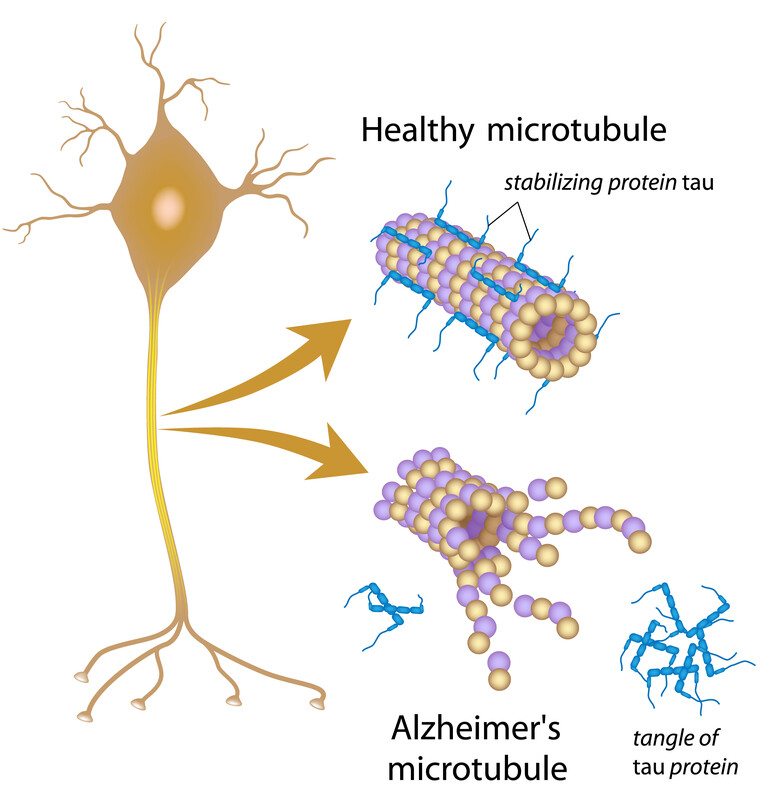Protein malnutrition is being suggested as a cause of and potential risk factor for senile dementia, how and the impact of diet, specifically proteins and amino acids and the deficiency of these food stuffs on neurodegeneration remain unknown and is the answer being sought in a new research paper. In this October 2021 paper in the journal Scientific advances (1), researchers show “that a low-protein diet resulted in down-regulated expression of synaptic components and a modest acceleration of brain atrophy in mice modeling neurodegenerative tauopathies.” The keywords you should have pulled out of that sentence was brain atrophy and neurodegenerative tauopathies (tau protein is implicated in the development of Alzheimer’s Disease.)
Brain atrophy and neurodegenerative tauopathies are usually held in check by seven selected essential amino acids.
What the researchers also found was that brain atrophy and neurodegenerative tauopathies are usually held in check by seven selected essential amino acids. Those amino acids being Leucine, Phenylalanine, Lysine, Isoleucine, Histidine, Valine, and Tryptophan. These researchers noted: “The up-regulation of inflammation-associated gene expression and progressive brain atrophy in the tauopathy model were profoundly suppressed by treatment with these essential amino acids without modifications of tau depositions.” Simply, you need these amino acids to protect from senile dementia.
Exploration of cerebrospinal fluid (CSF) amino acids and the impact of dietary intake on central levels may provide a comprehensive understanding of the metabolic component of Alzheimer’s disease.
A September 2021 study in the Journal of Alzheimer’s disease (2) also found a connection between amino acid levels and Alzheimer’s disease. In this paper diets were examined for changes in the cerebrospinal fluid’s amino acids levels in adults with mild cognitive impairment and normal cognition. The researchers found amino acid levels were correlated with changes in Alzheimer’s disease biomarkers including total tau.
The idea that amino acids may help prevent Alzheimer’s disease is far from new and evidence is evolving.
The idea that amino acids may help prevent Alzheimer’s disease is far from new and evidence is evolving. This is demonstrated by an August 2021 paper in the journal Nutrients (3) here researchers write: “. . . protein/amino acid intake is a growing area of research related to the prevention of Alzheimer’s disease and related dementia, and consumption is directly related to a number of disease-related risk factors such as low muscle mass, poor sleep, stress, depression, and anxiety. As a result, the role of protein/amino acid intake in terms of affecting modifiable risk factors for cognitive decline has provided a robust area for scientific exploration. However, this research is still speculative and specific mechanisms have to be proven.”
The latest research has shown that there are a host of factors that can cause and contribute to Alzheimer’s- from environmental toxins to nutrition, as in the case of this article amino acid deficiency, to heavy metal toxicity and more. Every person has a unique biochemistry which reacts to pollutants and toxins differently, and requires an individualized course of treatment. While the disease may look similar from person to person, we are not treating the disease. We are healing the individual.
In order to determine the unique contributing factors of each individual, we utilize extremely thorough blood and urine tests, as well as a complete examination of every aspect of the body, from mitochondrial function to heavy metal toxicity and more. We then create a personalized care plan based on these findings, which may include treatments such as chelation therapy, hyperbaric oxygen therapy, antioxidant nutritional supplements, intravenous vitamins, diet and nutrition.
These therapies and other discussions about Alzheimer’s disease can be found in these related articles.
Treating Gut Inflammation May Help Prevent Alzheimer’s Disease
Iron Toxicity: A Cause of Alzheimer’s Disease
Research on Vitamin B12 and Folic Acid Deficiency Connected to Alzheimer’s Disease and Dementia
Post-Menopausal Memory Loss
Green Tea and Alzheimer’s Disease
References
1 Sato H, Takado Y, Toyoda S, Tsukamoto-Yasui M, Minatohara K, Takuwa H, Urushihata T, Takahashi M, Shimojo M, Ono M, Maeda J, Orihara A, Sahara N, Aoki I, Karakawa S, Isokawa M, Kawasaki N, Kawasaki M, Ueno S, Kanda M, Nishimura M, Suzuki K, Mitsui A, Nagao K, Kitamura A, Higuchi M. Neurodegenerative processes accelerated by protein malnutrition and decelerated by essential amino acids in a tauopathy mouse model. Sci Adv. 2021 Oct 22;7(43):eabd5046. doi: 10.1126/sciadv.abd5046. Epub 2021 Oct 22. PMID: 34678069.
2 Russin KJ, Nair KS, Montine TJ, Baker LD, Craft S. Diet Effects on Cerebrospinal Fluid Amino Acids Levels in Adults with Normal Cognition and Mild Cognitive Impairment. Journal of Alzheimer’s Disease. 2021 Sep 28(Preprint):1-1.
3 Ozawa H, Miyazawa T, Miyazawa T. Effects of Dietary Food Components on Cognitive Functions in Older Adults. Nutrients. 2021 Aug;13(8):2804.





































Recent Comments